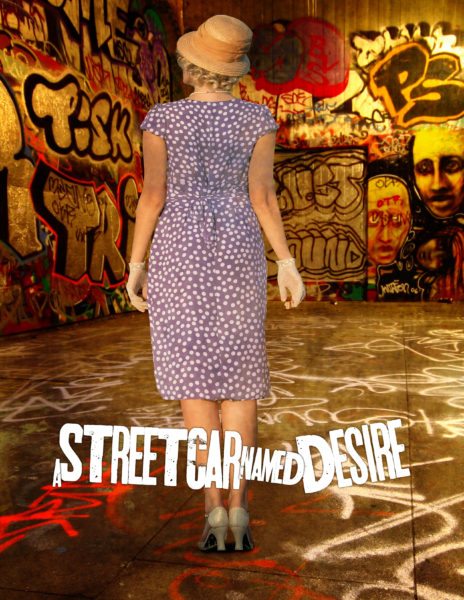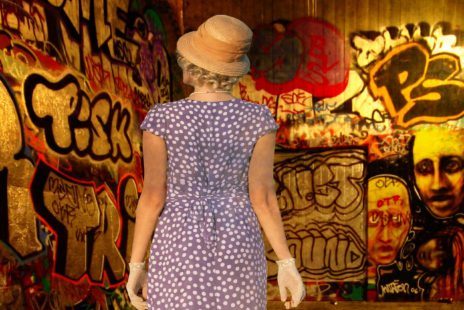
By May S. Ruiz
‘A Streetcar Named Desire’ is arguably Tennessee Williams’s most celebrated and momentous work. Originally a play which opened on Broadway in 1947, it has been made into a film, adapted as an opera, ballet, and for television.
And now Boston Court Performing Arts Center in Pasadena presents a reimagined modern version of ‘A Streetcar Named Desire,’ featuring a multicultural cast and contemporary setting. Onstage from February 15 to March 25, 2018, it is directed by Co-Artistic Director of Boston Court, Michael Michetti, and stars Jaimi Page as Blanche, Desean Kevin Terry as Stanley, and Maya Lynne Robinson as Stella.
Michetti had a very successful run directing two other plays in Pasadena – ‘Mrs. Warren’s Profession’ at A Noise Within and ‘King Charles III’ at the Pasadena Playhouse – and is aiming for a trifecta with ‘A Streetcar Named Desire’ at his home theatre company.
“I’ve never done any Tennessee Williams before now but I’m a big fan of ‘A Streetcar Named Desire,’” discloses Michetti. “I’m not exaggerating when I say I love it so much that I must have seen a dozen or more productions of it. I’m glad to have a ‘home’ where I can do passion projects.
Interestingly, I’ve been thinking about this play for a couple of years as a response to what I was sensing was happening to our world, before even a Trump presidency was possible. But the current political climate has only made it more timely; all the issues which were bubbling underground a little bit have now come to the surface.
‘A Streetcar Named Desire’ is so thematically rich – different threads stand out depending on how you focus it. Great works like it can be revisited in different eras and political circumstances and reflect current society.”
Michetti’s vision is a wide departure from its classic production as he sets it in the modern day with diverse actors. Pronounces Juilliard-trained Desean Terry, “It’s going to be a very different take and that’s why I’m really interested in it – Michael’s setting it in contemporary America. Blanche is a remnant of American history, dressed in the costume of the 1940s; she’s the only traditionally cast character and only Caucasian actor amidst an ethnically diverse group in modern clothes. She’s incongruent to the setting. As in the original play, Blanche is a fish out of water and Michael brings more attention to that fact. It’s a very intriguing concept, really.”

On assuming the role memorably portrayed by Marlon Brando in the 1947 play and the 1951 movie, Terry declares, “Fortunately I never saw the original play and I don’t remember much about the film version, which I think I saw when I was quite young. I don’t know what Marlon Brando did and I think that works to my advantage. I can try to recreate the character as I see the circumstances in the play and in response to our particular production. I will definitely honor the text in the way that it described Stanley.”
“To be honest, I’m a bit freaked out to be playing the role that Marlon Brando immortalized,” confesses Terry. “Well, actually I didn’t think about it until after I got the part when I told myself ‘What are you doing, Desean? Now you’re pitting yourself against an icon.’ However, Michael didn’t have a set idea of what Stanley should be like so it’s been a discovery process for both of us; we’re continually working on each role as part of the whole play.”
“We’re illuminating the love between Stella and Stanley which I think got shortchanged,” expounds Terry. “In this play we’re developing that relationship more, creating a healthy dynamic between them as much as we can with the play which has incidents of domestic violence. It’s pretty challenging what we’re trying to accomplish. I hope our interpretation of the play gives our audience a fresh appreciation for it.
“For me, personally, I hope they see a more human version of Stanley. If people respond to that I would feel pretty good. I’ve been in plays that speak to race relations and I enjoy the opportunity to effect change,” Terry concludes.
Michetti adds, “The primary impetus for this production was the discovery of the important themes of class, gender, and race that Williams touched on when he wrote it. Among them is how Blanche comes from a world with social privileges that even then, when the play was first produced, were no longer pertinent. Belle Reve, where Blanche grew up, was a big old house that came with a great deal of history but it was not a working plantation even in the 1940s. She was trying to hold onto an expectation about a way of the past that’s slipping away.
Even then Williams was exploring the changing demographics – there were more immigrants, people of different backgrounds. Many people were having trouble accepting that shift. It was something inherent in Blanche’s relationship with others.
By setting this production in contemporary urban environment populated with people of color and dropping in a Blanche, a white woman from the 1940s in that period’s clothes, hairstyle, and behavior, we emphasize to an even greater degree how much she is a relic of the past, unable to accept the world and move on. It was a contrast that Williams had intended and which I am visually amplifying.”

“It’s tricky because the play is so complex, it cannot be boiled down to single issues,” continues Michetti. “Within this treatment Blanche represents, in many ways, the loss of equilibrium that many white people are feeling. I want to deeply explore the flaw in her inability or trouble in accepting that the demographics of the world are changing. That said, any imbalance is uncomfortable. This was true then as it is today and is something we need to recognize. We’ll heal better by embracing and acknowledging it instead of avoiding or ignoring it.
White people should not keep trying to hold onto our privilege. The truth is, there is a cluelessness among us whites and we all need to be awakened. At the same time there is a real sense of loss that we should also be empathetic to.”
“However, I will not impose my morals on my audience – I want this play to reflect humanity and let people make up their mind about it,” says Michetti . “I think everyone is going to experience it through a different lens and see different things in it. There’s certainly an idea of investigating this divisiveness we have in our country right now and what that means. The beauty of this play is that all the characters are flawed people but also people we could be empathetic to. While I don’t think we will ever heal the divisions in our country we can show compassion to one another.
There are systemic problems we haven’t quite tackled but the beauty of theatre is that if you can do it well it’s an opportunity to explore these things through living, breathing humans, which touch not only our minds but our hearts. I think our minds are more successfully changed when our hearts are also changed.”
Michetti pronounces, “I’m very grateful to be doing for a living something that I love and am excited about. But more importantly, I’m always trying to discover what’s meaningful to me, to continue growing and reinventing myself. I’m in a period in my life when one of the most powerful things I can do is to help address vital issues in our time with an authentic sense of social justice focus. I think we have a great potential as a nation and a culture to be much better than we are. I want to genuinely fulfill the promise that our forefather said that all men are created equal.”
Through ‘A Streetcar Named Desire’ Michetti proves that his projects are not merely works of art but agencies of change as well. That is the true transformative power of theatre.







